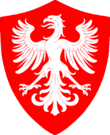National Conservative Party (Seketan): Difference between revisions
(Added history) |
No edit summary |
||
| Line 37: | Line 37: | ||
}} | }} | ||
{{Template:Politics of Seketan}} | {{Template:Politics of Seketan}} | ||
The [[National Conservative Party (Seketan)|National Conservative Party]], | The [[National Conservative Party (Seketan)|National Conservative Party]] ([[Seketese language|Seketese]]: ''Consyvaþeça Nasijoteça ynden''), also known as the '''Conservative Nationals''' ([[Seketese language|Seketese]]: ''Consyvaþeça Nasijotena'') or '''CNy''', is a conservative political party in Seketan. The party was founded in 1983 after several MH's of the [[Kjedorate Party]] left the caucus to form a more moderate party. Today the party sits on the centre-right of the [[Seketese political spectrum]] and supports more military integration with NATO and soft Euroscepticism. The party's current leader is Cjetor Tamš, who has been the leader since 2022. | ||
Since its creation, the party has been the main conservative party in Seketan, being the largest opposition in parliament for most of its history. From 1996 to 1999 and 2005 to 2014 the party was in government. Both times in government, except for 2006-2010, they formed a government with the [[Liberal Democratic Party (Seketan)|Liberal Democrats]]. | Since its creation, the party has been the main conservative party in Seketan, being the largest opposition in parliament for most of its history. From 1996 to 1999 and 2005 to 2014 the party was in government. Both times in government, except for 2006-2010, they formed a government with the [[Liberal Democratic Party (Seketan)|Liberal Democrats]]. | ||
Revision as of 18:37, 21 September 2023
This article is incomplete because it is pending further input from participants, or it is a work-in-progress by one author. Please comment on this article's talk page to share your input, comments and questions. Note: To contribute to this article, you may need to seek help from the author(s) of this page. |
National Conservative Party Consyvaþeça Nasijoteça ynden | |
|---|---|
| Abbreviation | CNY |
| Leader | Cjetor Tamš |
| President | Lyeslji Yorgan |
| Founded | March 2, 1983 |
| Split from | Kjedorate Party |
| Youth wing | Young Cenys |
| Ideology | Economic Liberalism Liberal Conservatism |
| Political position | Centre-Right |
| Colors | Blue |
| Commons Council | 27 / 293
|
| State Council | 10 / 106
|
| State Governors | 1 / 7
|
| State Legislatures | 64 / 487
|
 |
|---|
| This article is part of a series on the politics and government of Seketan |
The National Conservative Party (Seketese: Consyvaþeça Nasijoteça ynden), also known as the Conservative Nationals (Seketese: Consyvaþeça Nasijotena) or CNy, is a conservative political party in Seketan. The party was founded in 1983 after several MH's of the Kjedorate Party left the caucus to form a more moderate party. Today the party sits on the centre-right of the Seketese political spectrum and supports more military integration with NATO and soft Euroscepticism. The party's current leader is Cjetor Tamš, who has been the leader since 2022.
Since its creation, the party has been the main conservative party in Seketan, being the largest opposition in parliament for most of its history. From 1996 to 1999 and 2005 to 2014 the party was in government. Both times in government, except for 2006-2010, they formed a government with the Liberal Democrats.
Today the party is the third largest party in the Commons Council, and second largest in the State Council of the Hérvynsken and the governing party in 1 state, Giorgi-Alesk. They are currently the largest opposition party in 3 other states.
History
Historically, Seketan's right-wing was dominated by the authoritarian Kjedorate Party. During their authoritarian rule, partisan activity was severly resticted, thus limiting the practical application of "right-wing/left-wing" politics. With the conclusion of the 1978 Seketese Revolution and the start of the democracy in Seketan, the Kjedorates were allowed to participate in the first elections. Lead by Þorn Manneir, the Kjedorates campaigned on economic liberalism and anti-communism in an effort to distance themselves from their unpopular authoritarian past.